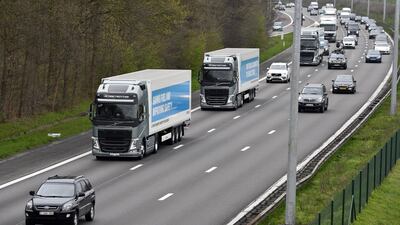Kivanç Arman, the automotive aftermarket regional director for the Middle East and Turkey at Robert Bosch Middle East, talks to The National about the development and potential of truck platooning.
How does truck platooning work safely and is it the future of freight transportation?
The way platooning works is by electronically connecting multiple trucks along a virtual longitudinal axis. The lead vehicle is "in charge", and all the following trucks accelerate, brake and turn in sync with it.
Are regions such as the UAE most suitable to truck platooning, given the availability of space?
The UAE is a major logistics hub with a lot of freeways that would be well suited for truck platooning. Especially the road between Abu Dhabi and Dubai, and the freight corridor connecting Jebel Ali Free Zone, Dubai World Central and Dubai International Airport, have great potential for implementing automation technologies across truck fleets.
A considerable volume of freight is moved by truck in the GCC today. Over 1 million trucks are currently in operation across the region, and this number increases by 5 to 9 per cent every year. Driver-free trucks will soon become an economic imperative for motor carriers, changing the economics of shipping, according to a recent study by the management consultancy Strategy&.
How do transportation companies benefit?
Transport and logistics companies would benefit from platooning in many ways. The trucking industry has a lot of room for improvement through automation and connectedness. At present, a truck driver’s cab has so many switches and levers to control different parts of the vehicle that it is very counter-intuitive and increases the risk for mistakes. At Bosch, we are envisioning a driver interface that is as easy to use as a smartphone, with clear control structures that would allow the driver to focus their attention on the road, while an electronic resource manager keeps information for drivers at a sensible minimum so they can prioritise.
Why hasn't widescale deployment of truck platooning yet become common?
Truck platooning is complex, and will require at least another five to 10 years to reach maturity. It requires advanced and reliable inter-vehicle connectivity to ensure that acceleration, braking and steering for each vehicle in the fleet follows that of the first truck in the convoy.
In order for this to work, we first have to make each individual truck automated and connect the powertrain, assistance and steering systems. This is a big task, but we are adding function after function to the automation process such as automated assistants for steering, turning and changing lanes. These components are essential for automated driving to be able to happen in a real-life environment, with human drivers in surrounding lanes, and varying weather and traffic conditions.
How soon does Bosch see the implementation of a safe, reliable and efficient multi-truck platooning concept?
In a freeway driving scenario, we anticipate this could be ready for implementation by 2025. The economic benefits of connected commercial vehicles are so large that already this year every new truck in the United States of America and in Europe will be capable of telematics.
Is Bosch testing truck platooning and if so where?
The Bosch VisionX truck study is still in its concept stage, but parts of the study are already being trialled in other ways. We have been testing driverless cars on freeways in the US, Germany and Japan for a couple of years now through our highway pilot test driving programme. Although commercial vehicles are larger in size, and truck platooning would still see a driver in each cabin at this stage, many of the technology components that are required are similar. Connectivity is the keyword for the future of the trucking industry, but just as for automated personal vehicles, legal conditions need to be created to make automated vehicles a reality on the production lines.

